|
Books Should Be Free Loyal Books Free Public Domain Audiobooks & eBook Downloads |
|
|
Books Should Be Free Loyal Books Free Public Domain Audiobooks & eBook Downloads |
|
Non-fiction |
|---|
|
Book type:
Sort by:
View by:
|
By: Ida M. Tarbell (1857-1944) | |
|---|---|
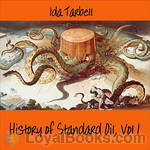 The History of Standard Oil: Volume 1
The History of Standard Oil: Volume 1
The History of the Standard Oil Company is a book written by journalist Ida Tarbell in 1904. It was an exposé of the Standard Oil Company, run at that time by oil tycoon John D. Rockefeller the richest figure in America's history. Originally serialized in 19 parts in McClure's magazine, the book was a seminal example of muckraking, and inspired many other journalists to write about trusts, large businesses that (in the absence of strong antitrust law in the 19th century) attempted to gain monopolies in various industries... | |
By: Ambrose Bierce (1842-1913) | |
|---|---|
|
At the outset of the American Civil War, [the writer Ambrose] Bierce enlisted in the Union Army's 9th Indiana Infantry Regiment....In February 1862 he was commissioned First Lieutenant, and served on the staff of General William Babcock Hazen as a topographical engineer, making maps of likely battlefields. Bierce fought at the Battle of Shiloh (April 1862), a terrifying experience that became a source for several later short stories and the memoir, "What I Saw of Shiloh". In June 1864, he sustained a serious head wound at the Battle of Kennesaw Mountain, and spent the rest of the summer on furlough, returning to active duty in September. He was discharged from the army in January 1865. | |
By: Louis Laravoire Morrow (1892-1987) | |
|---|---|
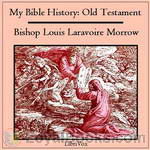 My Bible History: Old Testament
My Bible History: Old Testament
A short, simple Old Testament Bible History for children, but which can also be enjoyed by adults alike. Starting with Creation, the sections cover Adam and Eve, Abraham, Moses, etc. up to the promise of a Redeemer. The same format continues in the volume that follows - My Bible History: New Testament - by the same author. | |
By: Aristotle (384 BCE-322 BCE) | |
|---|---|
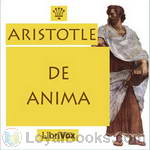 De Anima
De Anima
On the Soul (Greek Περὶ Ψυχῆς (Perì Psūchês), Latin De Anima) is a major treatise by Aristotle on the nature of living things. His discussion centres on the kinds of souls possessed by different kinds of living things, distinguished by their different operations. Thus plants have the capacity for nourishment and reproduction, the minimum that must be possessed by any kind of living organism. Lower animals have, in addition, the powers of sense-perception and self-motion (action). Humans have all these as well as intellect... | |
By: Carlo Giuseppe Quadrupani (1740-1807) | |
|---|---|
 Light and Peace: Instructions for Devout Souls to Dispel Their Doubts and Allay Their Fears
Light and Peace: Instructions for Devout Souls to Dispel Their Doubts and Allay Their Fears
Padre Quadrupani was an Italian priest and member of the Clerics Regular of St. Paul, also known as the Barnabites, from their association with St. Barnabas Catholic Church in Milan, Italy. Quadrupani's spirituality is based on that of the illustrious Doctor of the Church, St. Francis de Sales (1567-1622). Like St. Francis, the Padre offers spiritual advice that is practical and balanced. Perhaps it is owing to this that Quadrupani's treatise has been so well received by Catholic laypersons and has been recommended by numerous bishops over the years... | |
By: Charles Francis Adams, Sr. (1807-1886) | |
|---|---|
 Letters of Mrs. Adams, the Wife of John Adams, Vol. 1
Letters of Mrs. Adams, the Wife of John Adams, Vol. 1
Abigail Adams lived the American Revolution as the wife of one of its central figures--John Adams. Her family correspondence, published along with a memoir by her grandson, Charles Francis Adams, brings that era into eloquent focus. What was it like to hear the cannon's roar from your window? to face pestilence? food shortages? rampant inflation? devalued coinage? to raise four children alone--and earn the money to keep your household afloat, while your husband was engaged in politics and diplomacy miles and oceans away ... | |
By: Charles H. Spurgeon (1834-1892) | |
|---|---|
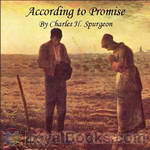 According to Promise, or The Lord’s Method of Dealing with His Chosen People
According to Promise, or The Lord’s Method of Dealing with His Chosen People
Charles Haddon (C.H.) Spurgeon (19 June 1834 – 31 January 1892) was a British Particular Baptist preacher and is still known today as the "Prince of Preachers". He was a strong figure in the Reformed Baptist tradition, defending the Church in agreement with the 1689 London Baptist Confession of Faith understanding, and opposing the liberal and pragmatic theological tendencies in the Church of his day. In his lifetime, Spurgeon preached to around 10 million people, often up to ten times each week at different places... | |
By: Various | |
|---|---|
 Prefaces and Prologues to Famous Books
Prefaces and Prologues to Famous Books
Charles W. Eliot, 21st President of Harvard University, edited this volume of prefaces ... authored by a Who's Who of World Literature: Bacon, Calvin, Caxton, Condell, Copernicus, Dryden, Fielding, Goethe, Heminge, Hugo, Johnson, Knox, Newton, Raleigh, Spenser, Taine, Whitman and Wordsworth. Eliot wrote in his preface to these prefaces, "No part of a book is so intimate as the Preface. Here, after the long labor of the work is over, the author descends from his platform, and speaks with his reader as man to man, disclosing his hopes and fears, seeking sympathy for his difficulties, offering defence or defiance, according to his temper, against the criticisms which he anticipates." | |
By: Aristotle (384-422) | |
|---|---|
 On the Heavens
On the Heavens
On the Heavens (Greek: Περί ουρανού, Latin: De Caelo or De Caelo et Mundo) is Aristotle's chief cosmological treatise. In it Aristotle argues that the Earth is a sphere by pointing to the evidence of lunar eclipses. Aristotle also provides a detailed explanation of his theory of 'gravity' arguing that things which contain 'earth' fall towards the centre of the Universe because 'earth' is naturally attracted to the centre of the Universe. Aristotle argues that if the planet Earth was moved to the location of the Moon then objects which contain 'earth' would not fall towards the centre of the Earth but rather towards the centre of the Universe... | |
By: Louis Hughes (1832-1913) | |
|---|---|
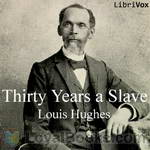 Thirty Years A Slave
Thirty Years A Slave
Louis Hughes was born a slave near Charlottesville, Virginia to a white father and a black slave woman. Throughout his life he worked mostly as a house servant, but was privy to the intimate details and workings of the entire McGee cotton plantation and empire.In Thirty Years A Slave Hughes provides vivid descriptions and explicit accounts of how the McGee plantation in Mississippi, and the McGee mansion in Tennessee functioned--accounts of the lives of the many slaves that lived, suffered and sometimes died under the cruel and unusual punishments meted out by Boss and his monstrously unstable and vindictive wife... | |
By: Katherine Jewell Everts (d. after 1919) | |
|---|---|
 The Speaking Voice
The Speaking Voice
From the Preface of The Speaking Voice: principles of training simplified and condensed: "This book offers a method of voice training which is the result of a deliberate effort to simplify and condense, for general use, the principles which are fundamental to all recognized systems of vocal instruction. It contains practical directions accompanied by simple and fundamental exercises, first for the freeing of the voice and then for developing it when free."Parts I and II of the book comprise advice... | |
By: William Bernard Ullathorne (1806-1889) | |
|---|---|
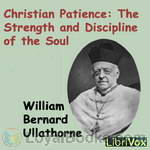 Christian Patience: The Strength and Discipline of the Soul
Christian Patience: The Strength and Discipline of the Soul
William Bernard Ullathorne was a Benedictine monk and Roman Catholic priest who ministered in Australia from 1833 until 1840 and then returned to his native England, where he was ordained a bishop in 1847 and served as Bishop of Birmingham from 1850 until 1888. He is best known for his catechetical trilogy: The Endowments of Man, The Groundwork of the Christian Virtues, and Christian Patience, published in the 1880s. Christian Patience is presented in twelve lectures. Bishop Ullathorne teaches that Christian patience is both a special virtue and a universal virtue... | |
By: Louis Laravoire Morrow (1892-1987) | |
|---|---|
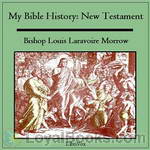 My Bible History: New Testament
My Bible History: New Testament
A short, simple New Testament Bible History for children, but which can also be enjoyed by adults alike. Starting with St. John the Baptist, and running through the beginning years of the Church, the sections cover Our Lord's birth, public life, miracles, death, resurrection and more. This is the companion volume to My Bible History: New Testament - by the same author. | |
By: Alban Butler (1711-1773) | |
|---|---|
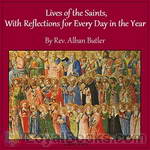 Lives of the Saints, With Reflections for Every Day in the Year
Lives of the Saints, With Reflections for Every Day in the Year
Compiled from the much larger 12 book set of "Butler's Lives of the Saints", this volume contains short biographies of the Saints, for each day of the year, followed by a reflection for each entry. | |
By: Aristotle (384 BCE-322 BCE) | |
|---|---|
 On Generation and Corruption
On Generation and Corruption
On Generation and Corruption (Ancient Greek: Περὶ γενέσεως καὶ φθορᾶς, Latin: De Generatione et Corruptione, also known as On Coming to Be and Passing Away) is a treatise by Aristotle. Like many of his texts, it is both scientific and philosophic (although not necessarily scientific in the modern sense). The philosophy, though, is essentially empirical; as in all Aristotle's works, the deductions made about the unexperienced and unobservable are based on observations and real experiences... | |
By: Friedrich Engels (1820-1895) | |
|---|---|
 Socialism: Utopian and Scientific
Socialism: Utopian and Scientific
The main idea of "Socialism: Utopian and Scientific" (1880) was distinguishing scientific socialism and utopian socialism. Engels begins by chronicaling the thought of utopian socialists, starting with Saint-Simon. He then proceeds to Fourier and Robert Owen. In chapter two, he summarizes dialectics, and then chronicles the thought from the ancient Greeks to Hegel. Chapter three summarizes dialectics in relation to economic and social struggles, essentially echoing the words of Marx. | |
By: John Lloyd Stephens (1805-1852) | |
|---|---|
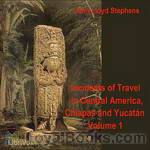 Incidents of Travel in Central America, Chiapas, and Yucatan, Vol. 1
Incidents of Travel in Central America, Chiapas, and Yucatan, Vol. 1
The year is 1838. The scene is the dense Honduran forest along the Copán River. Two men, John Lloyd Stephens and Frederick Catherwood, are about to rediscover Mayan civilization. Their guide, slashing through the rampant growth with his machete, leads them to a structure with steps up the side, shaped like a pyramid. Next they see a stone column, fourteen feet high, sculptured on the front with a portrait of a man, “solemn, stern and well fitted to excite terror,” covered on the sides with hieroglyphics, and with workmanship “equal to the finest monuments of the Egyptians... | |
By: Winfrid Herbst | |
|---|---|
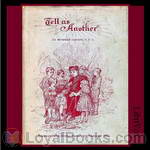 Tell Us Another! Stories That Never Grow Old
Tell Us Another! Stories That Never Grow Old
A collection of 65 little stories for the Catholic child (and adult), designed to captivatingly teach the truths and morals of the faith. This is the companion volume to "Just Stories" by the same author. | |
By: Elisha Gray (1835-1901) | |
|---|---|
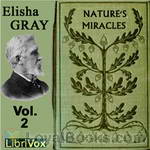 Nature's Miracles Volume II: Energy and Vibration
Nature's Miracles Volume II: Energy and Vibration
Elisha Gray was an American electrical engineer who co-founded the Western Electric Manufacturing Company. Gray is best known for his development of a telephone prototype in 1876 in Highland Park, Illinois and is considered by some writers to be the true inventor of the variable resistance telephone, despite losing out to Alexander Graham Bell for the telephone patent.Nature’s Miracles: Familiar Talks on Science, published in 1900, is a discussion of science and technology for the general public. Volume II is subtitled Energy and Vibration: Energy, Sound, Heat, Light, Explosives. | |
By: Plato (426-347 BCE) | |
|---|---|
 Meno
Meno
Meno (Ancient Greek: Μένων) is a Socratic dialogue written by Plato. Written in the Socratic dialectic style, it attempts to determine the definition of virtue, or arete, meaning in this case virtue in general, rather than particular virtues, such as justice or temperance. The goal is a common definition that applies equally to all particular virtues. Socrates moves the discussion past the philosophical confusion, or aporia, created by Meno's paradox (aka the learner's paradox) with the introduction of new Platonic ideas: the theory of knowledge as recollection, anamnesis, and in the final lines a movement towards Platonic idealism.. (Introduction by Wikipedia) | |
By: Saint Francis de Sales (1567-1622) | |
|---|---|
 Of the Love of God
Of the Love of God
Francis de Sales (1567-1622), Bishop of Geneva from 1602, was a renowned spiritual director who produced two classic guidebooks for earthly wayfarers on their spiritual journey to God: Introduction a la vie devote (Introduction to the Devout Life, 1609) and Traite' de l'amour de Dieu (Treatise on the Love of God, or Of the Love of God, 1616). In the Introduction to the Devout Life, Francis shows how anyone, whatever his or her calling or station in life, can strive for and achieve a life a piety and devotion to God... | |
By: Max Stirner (1806-1856) | |
|---|---|
 The Ego and His Own
The Ego and His Own
In this book, his most famous, Max Stirner presents a philosophical case for a radical egoism that shuns the socially-oriented outlooks of both "establishment" ideologies and of revolutionaries in favor of an extreme individualism. The book is most widely talked about today only through the lens of other philosophers' thought: Karl Marx and Friedrich Engels launched a famous assault on it in The German Ideology, and some draw a connection between Stirner's thoughts here and Nietzsche's egoism a generation later. But it is worth reading in its own right, as much for its lyricism as the challenge of its philosophical proposals. | |
By: St. John Chrysostom (349-407) | |
|---|---|
 Commentary on Galatians
Commentary on Galatians
St. Chrysostom’s Commentary on the Epistle to the Galatians is continuous, according to chapter and verse, instead of being arranged in Homilies, with a moral or practical application at their close, as in his exposition of other Epistles. It was written in Antioch, as Montfaucon infers from a reference which the Author, makes upon Chap. i., ver. 16 to other of his writings, which certainly were written about the same time in that city. (Introduction from the preface by John Henry Newman) | |
By: Hermann Gunkel | |
|---|---|
 The Legends of Genesis
The Legends of Genesis
The Legends of Genesis is the English translation of the introduction to Gunkel’s massive commentary, Genesis. Gunkel uses form critical analysis on the text of Genesis to determine the various genres of the biblical legends and their significance to the authors. Gunkel also uses form criticism to uncover buried clues as to the constituent sources of the text. Gunkel offers his hypothesis to explain how the various sources came to be combined and redacted, and how the text later came to be attributed to Moses. | |
By: Anonymous | |
|---|---|
 True Stories of Wonderful Deeds
True Stories of Wonderful Deeds
37 short pieces perfect for newer recorders. These one page Stories of (mostly) Wonderful Deeds were written for Little Folk to teach them about famous incidents in their history. Bonnie Prince Charlie, Nelson and Hardy, Bruce and the Spider, David Livingston, Canute, Sir Philip Sydney, and Elizabeth and Raleigh are just some of the well known people and incidents covered in short stories. | |
By: Unknown | |
|---|---|
 Three Ecumenical Creeds
Three Ecumenical Creeds
MANUAL OF SURGERY, OXFORD MEDICAL PUBLICATIONSBY ALEXIS THOMSON, F.R.C.S.Ed.PREFACE TO SIXTH EDITION Much has happened since this Manual was last revised, and many surgical lessons have been learned in the hard school of war. Some may yet have to be unlearned, and others have but little bearing on the problems presented to the civilian surgeon. Save in its broadest principles, the surgery of warfare is a thing apart from the general surgery of civil life, and the exhaustive literature now available on every aspect of it makes it unnecessary that it should receive detailed consideration in a manual for students... | |
By: May Gillington Byron (-1936) | |
|---|---|
 Days with the Great Composers
Days with the Great Composers
These light entertainments, originally published anonymously, are an imagined day in the life of each composer (Beethoven, Mendelssohn, Schubert, Chopin, Wagner, Gounod, Mozart, Schumann, Tschaikovsky). This gives the author scope to describe each one's work and life, sketchily, of course, but interestingly. | |
By: Ludwig Feuerbach (1804-1872) | |
|---|---|
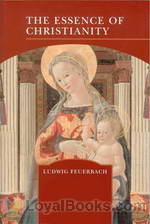 The Essence of Christianity
The Essence of Christianity
Taking issue with Hegel’s sense that God, as Logos, is somehow central to all that is, Feuerbach explores his own notion that Christianity, as religion, grew quite naturally from ordinary human observation. Only upon deeper, systematic reflection did people postulate a divine source–God. Religious teaching which loses sight of its own essential rootedness in human experience runs the risk becoming overly abstract, disconnected even, from realities which shape humanity and which impart meaning and dignity to life... | |
By: Martin Luther (1483-1546) | |
|---|---|
 The Bondage of the Will
The Bondage of the Will
On the Bondage of the Will (Latin: 'De Servo Arbitrio', literally, "On Un-free Will", or "Concerning Bound Choice"), by Martin Luther, was published in December 1525. It was his reply to Desiderius Erasmus's De libero arbitrio diatribe sive collatio or On Free Will, which had appeared in September 1524 as Erasmus's first public attack on Luther, after being wary about the methods of the reformer for many years. At issue was whether human beings, after the Fall of Man, are free to choose good or evil. The debate between Luther and Erasmus is one of the earliest of the Reformation over the issue of free will and predestination. | |
By: Pierre Loti (1850-1923) | |
|---|---|
 War
War
Pierre Loti [Julien Viaud] (1850-1923) was a French naval officer and novelist. The present book is one of his few works of non-fiction, a small collection of letters and diary entries that describe his views and experiences in the wars and military operations in which he participated. Besides World War I, he also sheds light upon his views and involvement in the preparations for the Turkish Revolution of 1923, for which until today a famous hill and popular café in Istanbul are named after him. | |
By: Mark Twain (1835-1910) | |
|---|---|
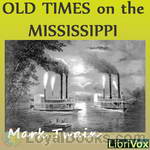 Old times on the Mississippi
Old times on the Mississippi
Old Times on the Mississippi is a non-fiction work by Mark Twain. It was published in 1876. Originally published in serial form in the Atlantic Monthly, in 1875, this same work was published as chapters 4 through 17 in Twain's later work, Life on the Mississippi (1883). Old Times on the the Mississippi has one last chapter that has nothing to do with the rest of the book. A Literary Nightmare describes the funny/sad/maddening effect that a catchy jingle can have on those unlucky enough to be captured by one. | |
By: Andrew Murray (1828-1917) | |
|---|---|
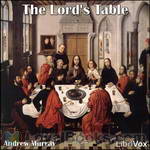 The Lord's Table
The Lord's Table
Murray suggests that his devotional, The Lord's Table, is not meant to replace scripture, but rather to strengthen believers' appreciation of God's word. Murray's meditations provide a thoughtful guide for believers who desire to develop a deeper understanding of the Lord's Holy Supper. The devotional covers the week before, during, and after the Supper, and each entry is labeled with the day of the week so that readers can manage devotions with ease. Murray first explains how believers can prepare to receive God's blessing during the weeks before the Supper... | |
By: Various | |
|---|---|
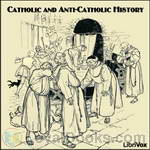 Catholic and Anti-Catholic History
Catholic and Anti-Catholic History
G.K. Chesterton and James Walsh join Hilaire Belloc in an energetic rollout of the means by which history becomes propaganda, to the damage, not only to truth, but to the human soul. | |
By: Benjamin Harris (1781-1858) | |
|---|---|
 The Recollections of Rifleman Harris
The Recollections of Rifleman Harris
The recollections of a British infantryman who served in the British army during the Napoleonic Wars. | |
By: Arnold Bennett (1867-1931) | |
|---|---|
 Self and Self-management: Essays about Existing
Self and Self-management: Essays about Existing
Bennett's essays always provide food for thought and bring a wry smile to the lips. Human nature, it appears, changes little over the ages, and Bennett's writing stands the test of time, though in the case of some of the essays in this eclectic collection, it is well to remember that they were written at the time of the First World War and the fight for women's suffrage. | |
By: Charles H. Spurgeon (1834-1892) | |
|---|---|
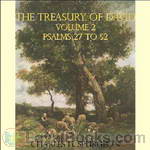 The Treasury of David, Vol. 2 (Abridged)
The Treasury of David, Vol. 2 (Abridged)
Charles Spurgeon was a British Particular Baptist preacher who remains highly influential among Christians of different denominations, among whom he is still known as the “Prince of Preachers”. In his lifetime, Spurgeon preached to around 10,000,000 people, often up to 10 times each week at different places. He was the pastor of the congregation of the New Park Street Chapel (later the Metropolitan Tabernacle) in London for 38 years.Spurgeon was a prolific author of many types of works. His accessible commentaries on the Psalms are a combination of meditation and teaching and are appropriate for anyone wanting to understand these familiar poems on a deeper level... | |
By: Henry Hazlitt (1894-1993) | |
|---|---|
 Thinking as a Science
Thinking as a Science
Written in a conversational style that will appeal to the younger person as well as seasoned professional, "Thinking as a Science" is timeless classic. Through eleven chapters, the last being a descriptive, annotated bibliography, Henry Hazlitt systematically takes the step-by-step on the process of introducing logic and context into the thinking process. The rather long chapter on "Reading and Thinking" clarifies several notions on where one needs to understand where mere knowledge acquisition ends and using reading the stimulate thinking begins.For an individual who was largely self taught, Hazlitt's contribution to the process of thinking is a must-read. | |
By: Ida Dandridge Bennett | |
|---|---|
 The Vegetable Garden: A Manual for the Amateur Vegetable Gardener
The Vegetable Garden: A Manual for the Amateur Vegetable Gardener
This book is a good reference on vegetable gardening. It covers the economic value of a vegetable garden, planning and locating the garden, maintaining soil fertility, hotbeds, garden tools, sowing seeds, transplanting seedlings, growing and storing vegetables, managing garden pests, and fall garden work. | |
By: H. G. Wells (1866-1946) | |
|---|---|
 Anticipations
Anticipations
Wells considered this book one of his most important, a natural follow-up to such works as his Man of the Year Million and The Time Machine. His goal was to get people to think and act in new ways. The book starts with a look at how humans get along socially and how they carry out their business ventures. It then discusses how these elements influence others, such as politics, the world of work, and education. H. G. tried to make clear how the current social order was disintegrating without preparing another to take its place. He then traced the roots of democracy, which in its present state he saw as unworkable. Instead, he proposed a new republic. He also critiqued modern warfare. | |
By: Rev. Gerald T. Brennan | |
|---|---|
 Angel Food: Little Talks to Little Folks
Angel Food: Little Talks to Little Folks
"Angel Food" consists of a series of short sermons for children on the truths of the Catholic Faith - but told with engaging stories, in a style and simple language that children can understand.The author was a parish priest in New York for many years during the mid 1900's. He was the author of several books for children, the most well known being the books in what is considered the "Angel Food" series. | |
By: Saint Francis de Sales (1567-1622) | |
|---|---|
 The Consoling Thoughts of Saint Francis de Sales
The Consoling Thoughts of Saint Francis de Sales
Francis de Sales (1567-1622) was a French priest and later bishop of Geneva who was revered as a master of spiritual direction and fondly remembered for his keen insights into the personal spiritual struggles of men and women of all faiths. His Introduction to the Devout Life, which he wrote especially for laypersons, and his Treatise on the Love of God remain fundamental reading for all earthly pilgrims who seek personal moral improvement and strive for spiritual perfection.Pere Huguet has gathered together in this one volume some of the more poignant insights and suggestions contained in the writings of Saint Francis de Sales and organized them under more than eighty chapters... | |
By: Catherine of Genoa | |
|---|---|
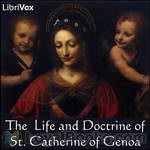 The Life and Doctrine of St. Catherine of Genoa
The Life and Doctrine of St. Catherine of Genoa
Saint Catherine of Genoa (Caterina Fieschi Adorno, born Genoa 1447 – 15 September 1510) is an Italian Roman Catholic saint and mystic, admired for her work among the sick and the poor. She was a member of the noble Fieschi family, and spent most of her life and her means serving the sick, especially during the plague which ravaged Genoa in 1497 and 1501. She died in that city in 1510.In 1551, 41 years after her death, a book about her life and teaching was published, entitled Libro de la vita mirabile et dottrina santa de la Beata Caterinetta de Genoa... | |
By: Hippolytus of Rome (170-235) | |
|---|---|
 Treatise on Christ and Antichrist
Treatise on Christ and Antichrist
In this late second century treatise, Hippolytus gives an excellent summary of Early Christian thinking on the subject of the antichrist. Familiar texts from Daniel and Revelation are treated together with his own current events to give a unique perspective. (Summary by Jonathan Lange) | |
By: Ida M. Tarbell (1857-1944) | |
|---|---|
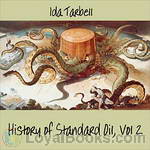 The History of Standard Oil: Volume 2
The History of Standard Oil: Volume 2
The History of the Standard Oil Company is a book written by journalist Ida Tarbell in 1904. It was an exposé of the Standard Oil Company, run at that time by oil tycoon John D. Rockefeller, the richest figure in America's history. Originally serialized in 19 parts in McClure's magazine, the book was a seminal example of muckraking, and inspired many other journalists to write about trusts, large businesses that (in the absence of strong antitrust law in the 19th century) attempted to gain monopolies in various industries. The History of the Standard Oil Company was credited with hastening the breakup of Standard Oil, which came about in 1911. | |
By: Pliny the Elder | |
|---|---|
 The Natural History, volume 2
The Natural History, volume 2
Naturalis Historia (Latin for "Natural History") is an encyclopedia published circa AD 77-79 by Pliny the Elder. It is one of the largest single works to have survived from the Roman empire to the modern day and purports to cover the entire field of ancient knowledge, based on the best authorities available to Pliny. The work became a model for all later encyclopedias in terms of the breadth of subject matter examined, the need to reference original authors, and a comprehensive index list of the contents... | |
By: John Cargill Brough (1834-1872) | |
|---|---|
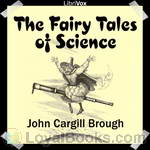 The Fairy Tales of Science
The Fairy Tales of Science
This book, written in the mid 19th century and illustrated by Charles H. Bennett, provides an entertaining introduction to topics in science for children. In each chapter, the author uses a popular myth or fairy tale to lay the groundwork for an equally fascinating "fairy tale of science" full of interesting facts and real life examples. | |
By: Hannah Whitall Smith (1832-1911) | |
|---|---|
 The God of All Comfort
The God of All Comfort
This book is written to Christians who profess to believe the Bible as God's revelation, but whose "lives are filled with discomfort and unrest." Smith aims to show that the Bible's claim that God is the "the God of all comfort" is not an over-advertisement or misunderstanding, but that it is possible to avail ourselves of the doubts and heavy anxieties that plague so many Christians.By explaining God's part and man's part, Smith aims to show her readers that it is possible to overcome feelings of defeat and despair and find rest and peace in Christ... | |
By: Various | |
|---|---|
 National Geographic Magazine Vol. 01 No. 1.
National Geographic Magazine Vol. 01 No. 1.
National Geographic Magazine Volume 1 Number 1 published in 1889. Topics of articles are:Announcement by the National Geographic SocietyIntroductory Address by the PresidentGeographic Methods in Geologic InvestigationClassification of Geographic Forms by GenesisThe Great Storm of March 11 to 14, 1888The Great Storm off the Atlantic Coast of the United States, March 11th to 14th, 1888The Survey of the CoastThe Survey and Map of Massachusetts | |
By: Aristotle (384 BCE-322 BCE) | |
|---|---|
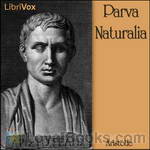 Parva Naturalia
Parva Naturalia
Parva Naturalia [the "short treatises on nature" (a conventional Latin title first used by Giles of Rome)] is a collection of books by Aristotle, which discuss natural phenomena involving the body and the soul. The books are as follows:I - On Sensation and the SensibleII - On Memory and RecollectionIII - On Sleeping and WakingIV - On DreamsV - On Prophecy in SleepVI - On Longevity and Shortness of LifeVII - On Youth and Old Age, Life and Death VIII - On Respiration | |
By: John Phin (1830-1913) | |
|---|---|
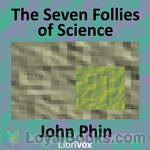 The Seven Follies of Science
The Seven Follies of Science
The seven follies of science; a popular account of the most famous scientific impossibilities and the attempts which have been made to solve them to which is added a small budget of interesting paradoxes, illusions, and marvels. | |
By: Arthur Conan Doyle (1859-1930) | |
|---|---|
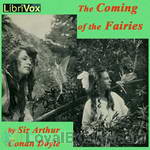 The Coming of the Fairies
The Coming of the Fairies
After a number of deaths in his close family, Sir Arthur Conan Doyle turned to spiritualism in hope of finding proof of the afterlife. Being open in this way, he wanted to believe that spirits and other supernatural being including fairies were real. Because of this he believed the photographs of fairies taken by the Cottingley girls were proof of the existence of such beings. In this book he presents his stance on the issue. Eventually it was proven that the photographs were indeed a hoax. | |
By: Nathaniel Hawthorne (1804-1864) | |
|---|---|
 Our Old Home
Our Old Home
These essays, based on Hawthorne’s stay in England from 1853 to 1857 as American Consul in Liverpool, were first published in the form of a series of travel articles for The Atlantic Monthly.In these writings, he displays his humor, his empathetic nature, his pride in his country, and sometimes his sharp judgment of others. He shares with us the difficulties of being a consul in the 1850’s, takes us on a tour with him through rural England and Scotland, shows us the splendors of London, and the horrors of the poverty that so many suffered. (Introduction by Margaret) | |
By: William Hazlitt | |
|---|---|
 The Plain Speaker: Opinions on Books, Men, and Things
The Plain Speaker: Opinions on Books, Men, and Things
The Plain Speaker: Opinions on Books, Men, and Things is a posthumous collection of essays by William Hazlitt, organized by his grandson, William Carew Hazlitt. The book contains some of Hazlitt's more famous essays that hadn't been previously published in book format. | |
By: Charles Godfrey Leland (1824-1903) (1824-1903) | |
|---|---|
 The Mystic Will
The Mystic Will
This book presents a method of developing and strengthening the faculties of the mind, through the awakened will, by a simple, scientific process possible to any person of ordinary intelligence | |
By: G. K. Chesterton (1874-1936) | |
|---|---|
 A Chesterton Calendar
A Chesterton Calendar
Go through the year, day by day, with the wit and wisdom of G.K. Chesterton! Compiled from the writings of 'G.K.C', both in verse and in prose, each day of the year is provided with a generally short quotation from one of his many works. Also includes a section apart for the moveable feasts. | |
By: Henry Scougal (1650-1678) | |
|---|---|
 The Life of God in the Soul of Man
The Life of God in the Soul of Man
Henry Scougal was born in Scotland in 1650. The son of the Bishop of Aberdeen, he flourished under rigorous teaching to become Professor of Philosophy at King's College, Aberdeen. In 1672, Scougal was ordained minister in Auchterless and, after a year, returned to King's College as Professor of Divinity. He continued in this office until his death in 1678.The Life of God in the Soul of Man is, in reality, a letter of doctrine and encouragement to a friend wavering in the faith, and was never intended for publication... | |
By: Andrew Murray (1828-1917) | |
|---|---|
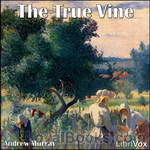 The True Vine
The True Vine
Andrew Murray's True Vine is a thirty-one day devotional focusing on Christ's Parable of the Vine and the Branches in John 15. The devotional for each day, though short, elaborates and expounds upon John 15, providing spiritual insight along the way. Murray repeats important themes--like abiding in Christ--throughout the different days. Noticing how they develop and grow with each successive read, countless small groups and individuals have found Murray's keen spiritual teachings fruitful. An excellent devotional, True Vine is recommended for daily spiritual nourishment. | |
By: Hiram Chase | |
|---|---|
 Two Years and Four Months in a Lunatic Asylum
Two Years and Four Months in a Lunatic Asylum
Hiram Chase is a well liked Reverend in a small ministry in Utica. When his mental and physical health deteriorates, he is taken to Utica lunatic asylum. After his stay in the asylum, Hiram documents his experiences and those of other patients in the asylum. He describes his daily routine and the negative experiences he had, along with praising certain individuals whom he met during his "Two Years and Four Months in a Lunatic Asylum". | |
By: Geoffrey H. Malins (1887-1943) | |
|---|---|
 How I Filmed the War
How I Filmed the War
An account of World War I and the experience of filming it by an early cinematographer (and, after the war, successful director) who was there. | |
By: Lord Thomas Cochrane (1775-1860) | |
|---|---|
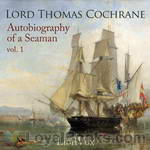 Autobiography of a Seaman, Vol. 1
Autobiography of a Seaman, Vol. 1
This two volume work is the autobiography of Lord Cochrane, a naval captain of the Napoleonic period. His adventures are seminal to the development of naval fiction as a genre. Marryat sailed with Cochrane, while later writers borrowed incidents from this biography for their fictions. Most notable among these is Patrick O'Brian, three of whose novels have clear parallels to incidents in the life of Cochrane. This first volume covers Cochrane's earlier life, during which he is most active militarily. (Introduction by Timothy Ferguson) | |